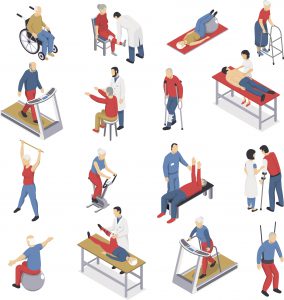NCCI Opening Session
Bill Donnell, President and CEO of NCCI, kicked off the 2018 NCCI Annual Issues Symposium with a discussion of The Future@Work. Back in the early 90’s, the workers’ comp industry experienced six consecutive years of losses. Contract that with industry profitability the last 6 years. The market has gone up and down over the years but the trends the last few years have been good. The ratio of fatalities per 100,000 workers is down sharply compared to the 1990’s, even though that trend has gone upward the last two years. Accident frequency rates have trended downward for years. Clearly workplaces
(Read the full article…)
Strategies for Opioid Intervention
At the 2018 Insurance Rehab Synergy Group Annual Conference Robert Hall, MD and Tron Emptage both from Optium Workers’ Compensation, discussed opioid intervention strategies. One of the problems is that opioid medications are too easy to obtain: 60% of US citizens have leftover narcotics in their home. 70% of opioid prescriptions abused come from a friend or relative. 91% of patients who overdose receive another opioid prescription within 10 months. Education of all stakeholders is needed to stop the opioid crisis. This includes patients, medical providers, policy makers, payers, and employers. Some great tools for education include letters to the
(Read the full article…)
Rehabilitation and Recovery
At the 2018 Insurance Rehab Synergy Group Annual Conference, a panel was a “fireside chat” on the past and future of rehabilitation and recovery. The panel included: Mark Ashley, SC.D, CCC-SLP, CCM, CBIST – President/CEO Centre for Neuro Skills Gary Ulichny, PhD – President/CEO GRU Health Care Kenny Hosack – Craig Hospital Natalie Hefner – Workers’ Compensation Reinsurance Association Highlights: Rehabilitation tries to minimize impairment, disability and the handicap. We need to do a better job encouraging people to get back in the community. The World Health Organization definition of disability is a good one but we need to emphasize
(Read the full article…)
Post-Concussive Syndrome
At the 2018 Insurance Rehab Synergy Group Annual Conference, Elizabeth Sandel, MD, Medical Director for Paradigm Managment Services, discussed post-concussive syndrome. Annually there around 2.5 million people with concussions and it is estimated that 25% of the population will have a concussion at some point in their life. Incidents of concussions are up significantly, but this is likely due to greater awareness of the issue so people seek treatment. According to a NPR-Truven poll, 29% of people who reported they have had a concussion say they have long-term headaches. However, there is no validation that the headaches are linked to
(Read the full article…)
Telemedicine
At the 2018 Insurance Rehab Synergy Group Annual Conference, a panel discussed the use of telemedicine. The panel included: Mark Johnson – Sedgwick (moderator) Teresa Bartlett, MD – SVP and Senior Medical Officer, Sedgwick Alan Lee, PT, DPT, PhD, CWS – Professor, Mount Saint Mary’s University Ted Jeffries – Director of Claims, Missouri Employers Mutual Telehealth really started in the military. There was not an expert available in the field all the time when needed so the physicians communicated with the field operatives to assist them in stabilizing and treating the patients. Telehealth is also very common in cancer care
(Read the full article…)
Treatment Guidelines and Drug Formularies
At the 2018 Insurance Rehab Synergy Group Annual Conference, Ingrid O’Keefe from MCG Health discussed the use of evidence based medicine in the development of treatment guidelines and drug formularies in workers’ compensation. Evidence based medicine is healthcare based on clinical studies of what works best and what does not. It involves transparent literature review to determine what is considered the best supported treatments and standards. Treatment guidelines take evidence based medicine one step further in providing medical treatment recommendation based on scientific studies. There are commercially developed guidelines, specialty treatment guidelines, and state specific guidelines. Guidelines are based on
(Read the full article…)
Biofeedback in Pain Management
At the 2018 American Academy of Pain Medicine Annual Meeting, Felix Laevsky, MS, from Shirley Ryan AbilityLab discussed how biofeedback is used in pain management treatment. Role of Biofeedback Develop skills to evoke relaxation response and control stress response. Develop skills to manage pain and pain related symptoms at any time in any real life situation. Develop skills to control symptoms while learning and implementing techniques taught by other disciplines. Become aware of one’s own abilities and capabilities of controlling psychological functions. Biofeedback teaches patients how to control their relaxation response. By doing this, patients can decrease their metabolism, heart
(Read the full article…)
Role of Physical Therapy in Multidisciplinary Pain Management
At the 2018 American Academy of Pain Medicine Annual Meeting, Hannah Nilles, PT, DPT, from Shirley Ryan AbilityLab, discussed the role of physical therapy in a multidisciplinary pain management program. When patients start physical therapy in a multidisciplinary pain management program, their initial reaction is to question how this therapy is going to be different from all the therapy they have had in the past. The PT in these programs is different in the following areas: Active instead of passive modalities. Graded exposure. Graded exposure to exercise helps desensitize a sensitive nervous system by using the body to teach the
(Read the full article…)
Advances in Stem Cell Research
At the 2018 Insurance Rehab Synergy Group Annual Conference, Stephen McKenna, MD, Chief of the Rehabilitation Trauma Center at Santa Clara Valley Medical Center talked about the history of stem cells and the potential from current stem cell trials. Embryonic stem cells are extracted from fertilized human eggs that were not implanted. Often times these were extra eggs left over from fertilization treatments. There has been ethical questions around the use of embryonic stem cells which has caused issues with the funding and authorization of this research. The value of stem cells is that, in theory, they have the ability
(Read the full article…)
Behavior Regulation and Acquired Brain Injury Rehab
At the 2018 Insurance Rehab Synergy Group Annual Conference, Martin Waalkes, PhD, Director of Neuro Rehabilitation for Hope Network Neuro Rehabilitation discussed the challenges of behavior regulation and engagement in acquired brain injury rehabilitation. One of the biggest challenges with brain injury patients can be with their behavior. Patients can have self-centered behavior and not understand the needs and perceptions of others. They also can have problems with self-control which can lead to issues with aggressiveness, outbursts, and anxiety. Up to 75% of brain injury patients can have issues with irritability. These issues with irritability and agitation can impact the
(Read the full article…)











